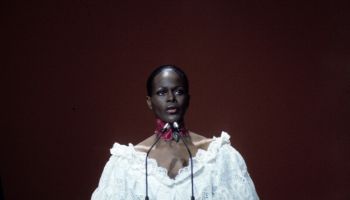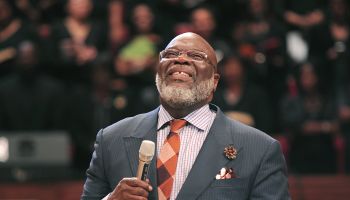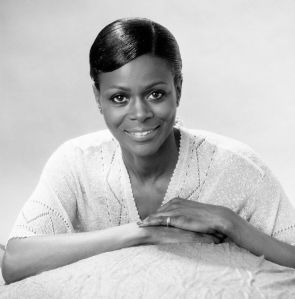
Source: Jack Mitchell / Getty
Trailblazing actress Cicely Tyson died Thursday at the age of 96, leaving behind more than just an impact with her movies; she left a thesis on how to live life to the fullest while remaining uncompromised.
Her death came just two days after the release of her long-awaited memoir, “Just As I Am,” in which Tyson recounts her life and career filled with pitfalls and soaring heights; a beautiful footnote to a well-lived life and a job well done.
While the loss is great, she lives not just in the flesh but through the spirits of the many “children” she birthed in the film industry who are moving the torch she brightly lit forward. As a Black woman in Hollywood who came up during the civil rights movement, Tyson took her platform as an actress seriously and opted to display the humanity and complexities of Black women. She never shied away from reveling in her ancestry through choices in fashion, bright and oftentimes regal and eclectic, or through her hair with a short-cropped afro, a braided style, or letting it cascade down her shoulders.
Born in Harlem on Dec. 19, 1924, to West Indian immigrants from Nevis, Tyson’s first few months were short of a miracle. Doctors reportedly told her parents she would not live past three months due to a heart murmur. But her spirit showed early signs of resilience as she lived 96 years past her predicted timeline.
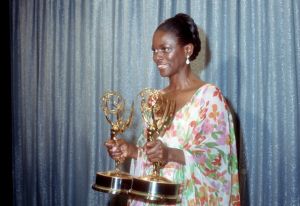
Source: Michael Ochs Archives / Getty
Because of her religious upbringing, Tyson spent most of her time in her church community until she began modeling, which led to a career as an actress. In her early days as a New York theatre actress, she often joined her friends Maya Angelou and James Earl Jones on stage.
In a 2017 Elle interview, Tyson told Viola Davis that her choice to live in a more secular space caused tension between her and her mother. And it may be that reason that she gravitated towards roles that spotlighted her regality, instead of dimming it. Her choice to pass on roles she felt portrayed Black women through a stereotypical lens such as a domestic worker, sex worker or drug addict, meant she would sometimes go years before she came across an opportunity she felt worthy.
To date, her roles are still hailed for their brilliance.
In her Oscar-nominated role for “Sounder” in 1972, Tyson played a Depression-era mother who resorts to any means necessary to support her children after her sharecropping husband is arrested for stealing food.
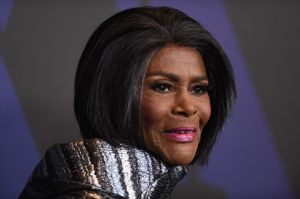
Source: VALERIE MACON / Getty
“The story in ‘Sounder’ is a part of our history, a testimony to the strength of humankind,” Tyson told The New York Times in 1972. “Our whole Black heritage is that of struggle, pride and dignity. The Black woman has never been shown on the screen this way before.”
She followed up that role with “The Autobiography of Miss Jane Pittman,” where she played a Black woman who rose out of Jim Crow, transforming into Pittman from age 23 to 110. For her portrayal, she made history as the first Black woman to win a Lead Actress Emmy.
And Tyson not only opted to bring a visual element of dignity to her portrayals but she did it through her physicality as an actress.
In a moving scene from “The Women Of Brewster Place,” Tyson and her on-screen daughter Melanie, played by Robin Givens, have a dynamic exchange representing an ongoing conversation between Black generations regarding respectability, power dynamics and what it means to move through the world, especially as a Black woman.
“I am alive because of the blood of a people who never scraped, or begged, or apologized for what they were,” Tyson said in the role. “They asked only one thing of this world. To be allowed to be. And I learned through the blood of these people that Black isn’t beautiful, it isn’t ugly, it isn’t kinky hair, it isn’t straight hair. Black is just Black.”
She also portrayed memorable Black women like Coretta Scott King, the mother of Rosa Parks and Kunta Kinte’s mother in “Roots.”
Later in life, Tyson enjoyed a resurgence in her career across theatre, television and film, starring in a slew of projects like “Diary of a Mad Black Woman,” “The Help,” and “How to Get Away With Murder” while she was in her 70s, 80s, and 90s. Her efforts continued to make history. In 2013 she won a Tony for her role in “The Trip to Bountiful” at the age of 88.
In 2015 she was recognized as a Kennedy Center honoree and in 2016 former President Barack Obama awarded her with the Presidential Medal of Freedom. In 2018 she made history again as the first Black woman to receive an honorary Oscar.
There is no way to encapsulate someone who honed their craft and dedicated 70 years of their life to barrier-breaking. But as art often imitates life, Cicely Tyson exemplified that the road to freedom and authenticity begins and remains with choosing oneself.
SEE ALSO:
It’s Time For Our Leaders To Make Good On Their Promises To Black People
In Choosing Herself, Cicely Tyson Fully Portrayed The Beauty Of Black Women was originally published on newsone.com









